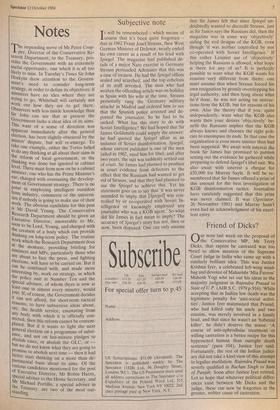Subjective note
It will be remembered – which means of course that it's been quite forgotten – that in 1962 Franz Josef Strauss, then West German Minister of Defence, nearly ended his own career as a result of his feud with Spiegel. The magazine had published de- tails of a major Nato exercise in Germany Strauss persuaded Adenauer that this was a case of treason. He had the Spiegel offices sealed and searched, and the top echelons of its staff arrested. The man who had written the offending article was on holiday in Spain with his wife at the time. Strauss personally rang the Germany military attaché in Madrid and ordered him to see that the Spanish police arrested and de- ported the journalist. So he had to be sacked. What has this story to do with Soviet Intelligence? We had hoped that Sir James Goldsmith could supply the answer: he had quoted the Spiegel affair as an instance of Soviet disinformation. Spiegel, whose current publisher is one of the men jailed in 1962, sued him for libel; and after two years, the suit was suddenly settled out of court. Sir James had planned to produce in court evidence from defectors to the effect that the Russians had wanted to get rid of Strauss, and that they had planned to use the Spiegel to achieve this. Yet his statement goes on to say that 'it was never intended to imply that [Spiegel] was con- trolled by or co-operated with Soviet In- telligence or knowingly employed any journalist who was a KGB agent.' So what did Sir James in fact mean to imply? The accuracy of Spiegel's story has not, then or now, been disputed. One can only assume that Sir James felt that since Spiegel un- doubtedly wanted to discredit Strauss, just as Sir James says the Russians did, then the magazine was in some way 'objectively' aiding the evil designs of the KGB, even though 'it was neither controlled by nor co-operated with Soviet Intelligence.' If this rather Leninist use of 'objectively' helping the Russians is allowed, what hope is there for any of us? It is perfectly possible to want what the KGB wants for reasons very different from theirs: one must assume that when Strauss forced his own resignation by grossly overstepping his legal authority, and then lying about what he'd done, he was not acting on instruc- tions from the KGB, but for reasons of his own. Also the theory that if you, quite independently, want what the KGB also wants then your desires 'objectively' be- nefit the Russians implies that the KGB always knows and chooses the right poli- cies to encompass its ends. In that case the organisation is even more sinister than had been supposed. We await with interest the book Sir James has promised to publish setting out the evidence he gathered while preparing to defend Spiegel's libel suit. We also await with interest a cheque for £50,000 for Murray Sayle. It will be re- membered that Sir James offered a prize of this amount for the best investigation of KGB disinformation tactics. Journalists have carelessly suggested that this prize was never claimed. It was (Spectator, 26 November 1981) and Murray hasn't even had an acknowledgment of his excel- lent entry.






















































 Previous page
Previous page